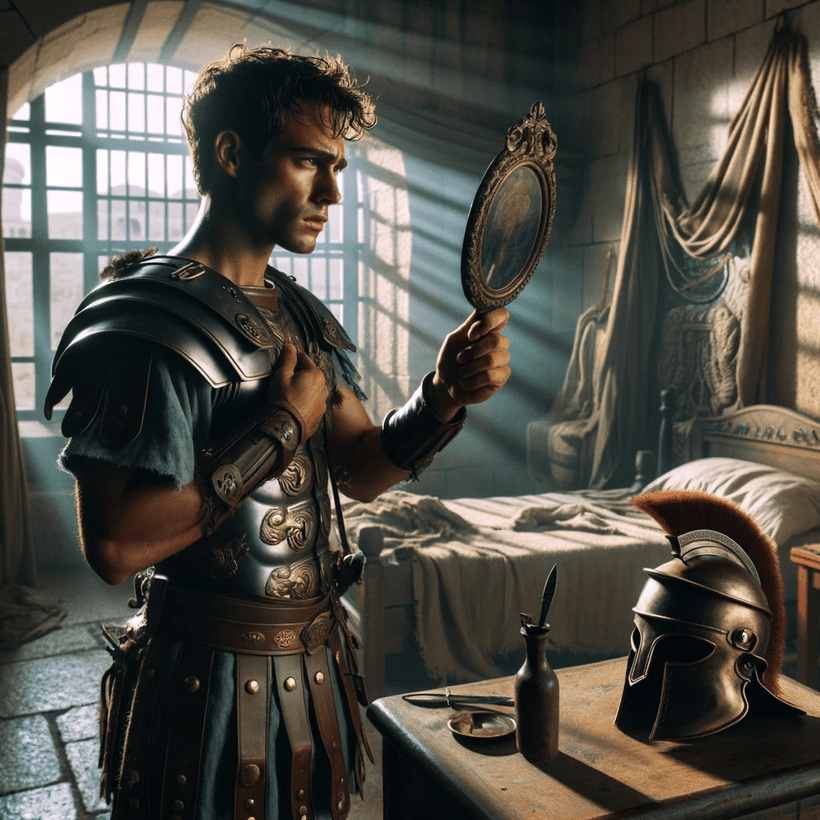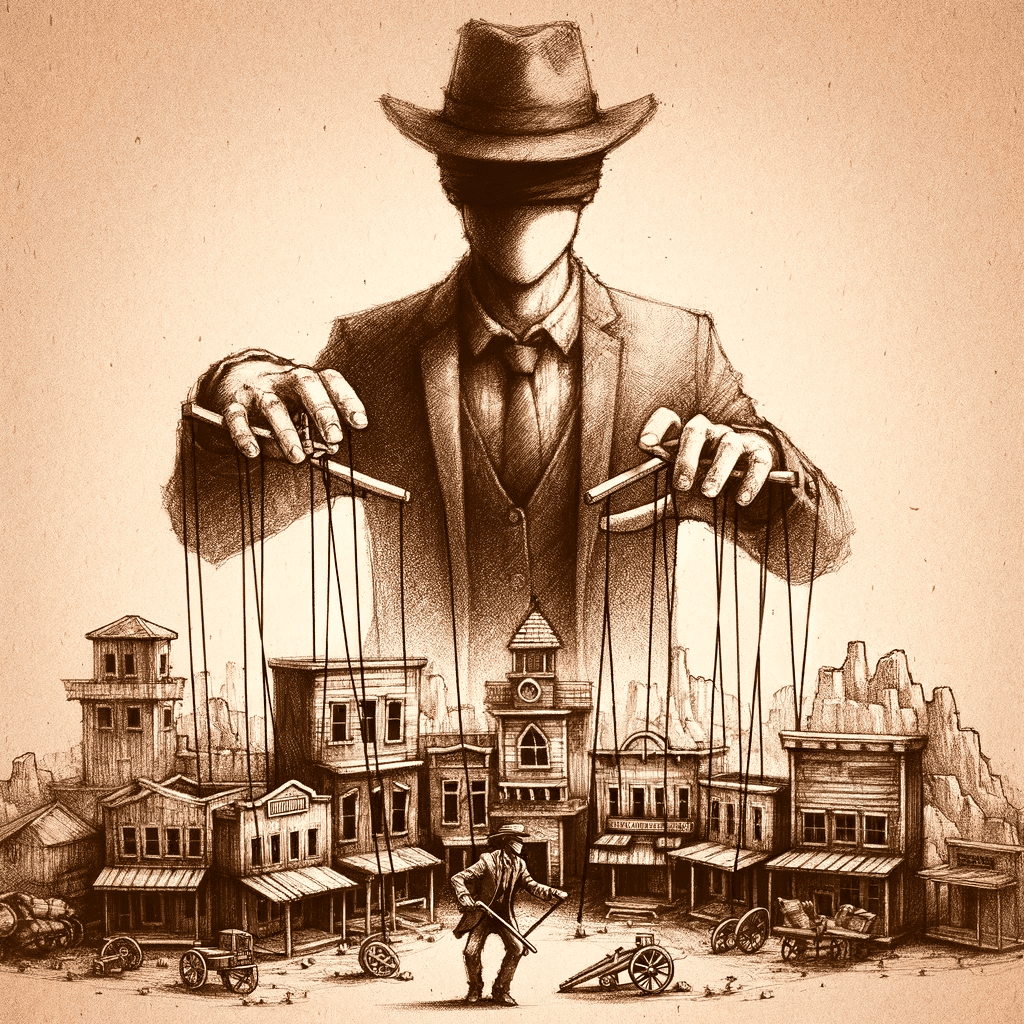
Jerusalem April 3rd – 33 AD – The Story Of Cartaphilus
Cartaphilus stirred from his slumber, the morning light assaulting his eyes like a legion’s charge. He groaned, the aftermath of last night’s revelry pounding against his temples in relentless waves. The young Roman guard pushed himself up, his cot creaking under the protest of sudden movement.
With a stretch that cracked the stiffness from his back, Cartaphilus scanned the spartan room he called home. His armor lay scattered across the floor, a silent testament to his hasty undressing before collapsing into bed. He let out a chuckle; even in the throes of drunken clumsiness, he had managed to place his helmet perfectly atop the small wooden table beside his bed, as if it were a precious relic rather than a piece of standard-issue military equipment.
Cartaphilus swung his legs over the side of the cot and winced as he planted his feet on the cool stone floor. The air was still crisp with dawn’s embrace, and Jerusalem slowly awakened outside his window. The city’s sounds began to filter through—traders preparing their stalls, donkeys braying, and somewhere in the distance, the Temple’s morning prayers echoed solemnly.
He splashed cold water on his face from a basin, chasing away the remnants of sleep and numbing the ache in his head. Water dripped down his strong jawline as he peered at himself in a small bronze mirror. “Another day in paradise,” he muttered with a smirk.
Clad in nothing but his tunic, Cartaphilus set about gathering his armor. His movements were deft despite last night’s indulgence—a testament to muscle memory and rigorous training. Each piece clanged lightly as he piled them onto the table for inspection. A dent here, a scratch there; each blemish told stories of close calls and raucous brawls.
The door swung open with sudden force, and in barged Drusus, fellow guard and partner-in-crime from last evening’s escapades. “By Jupiter’s beard, you look like you wrestled a minotaur,” Drusus exclaimed with a wide grin plastered on his ruddy face.
“And you look like you’ve swallowed one,” Cartaphilus retorted, nodding at Drusus’s rounded belly. Laughter filled the room as Drusus joined Cartaphilus in readying their gear. The pair worked together often enough that their banter flowed as smoothly as their efficiency in arming up for duty.
“Got yourself into another mess last night,” Drusus noted while fastening a strap on Cartaphilus’s breastplate. “You sure have a way with people—even had that Greek merchant laughing after you spilled wine all over his robes.”
Cartaphilus chuckled at the memory. “Ah, but did you see how I smoothed it over? Offered him a drink on me and promised to visit his stall today.”
Drusus shook his head with amusement. “Only you could turn spilling wine into an opportunity to make a friend.”
Cartaphilus finished strapping on his sandals and stood tall, now fully armored except for one final piece—his helmet. He reached for it reverently; despite its battered appearance, it was more than mere protection—it was a symbol of who he was: Cartaphilus, son of Rome, guardian of Jerusalem.
As they exited into Jerusalem’s streets bathed in golden morning light, Cartaphilus couldn’t help but feel pride swell within him. The city teemed with life—merchants calling out to passersby, children darting through the crowds, and over it all, the ever-present hum of countless conversations blending into a symphony of everyday existence.
A group of children playing by the roadside stopped their game to watch Cartaphilus pass by. He flashed them a roguish grin and tossed them an apple he’d pilfered from breakfast.
“Look sharp!” Drusus warned as they approached their post near one of Jerusalem’s bustling markets. “Captain’s been on edge lately.”
Cartaphilus nodded but couldn’t suppress another smile as he heard giggles from behind him—the children had divided up the apple amongst themselves.
Captain Lucius approached with purposeful strides, his presence commanding immediate attention. The well-worn lines on his face spoke of battles fought and burdens borne, and today they seemed etched deeper than usual.
“Cartaphilus,” Lucius called out, his voice cutting through the din of commerce and chatter.
The young guard snapped to attention, his earlier levity dissolving into military formality. “Sir!”
“You are to report to the Praetorium. Governor Pilate requires additional men for a trial.”
Cartaphilus nodded briskly. “Understood, sir.”
Lucius’s gaze lingered on Cartaphilus for a moment longer than necessary. “You will be overseeing the trial of Jesus of Nazareth.”
Cartaphilus felt a momentary lurch in his stomach, the name tugged at the edges of his memory, beckoning images from a time before the grind of duty had fully taken hold of his life.
A wedding in Cana, a celebration that had spilled over into the streets, laughter and music intertwining with the scent of fresh bread and roasted meats. Cartaphilus had been there, not as a guard but as a guest, mingling with strangers who soon became friends under the influence of good cheer and better wine.
It was there that he had first heard the name, murmured in tones both awestruck and skeptical. Jesus, a man whose reputation as a healer and teacher was beginning to unfurl like a banner across the regions. Curiosity had piqued Cartaphilus then, as it did now, and he had maneuvered through the throng to catch a glimpse of this person who sparked such fervent discussion.
The memory unfolded in vivid detail: Jesus stood beside stone jars used for ceremonial washing, his countenance serene amidst the boisterous revelry. The wine had run dry—an embarrassing misfortune for any host—and whispers swirled about the impending social disaster.
Then something remarkable occurred. With an air of quiet confidence that bordered on the divine, Jesus instructed the servants to fill the jars with water. Cartaphilus had watched with skeptical eyes, expecting nothing more than a desperate attempt to salvage an awkward situation.
But when they drew from the jars again, it was not water that poured forth but wine—rich, red, and so full-bodied it seemed to sing with its own life. Cartaphilus had tasted it himself, letting the liquid’s warmth seep into him, bringing with it an unbidden sense of joy and wonder.
“Will there be anything else, sir?” Cartaphilus asked after a respectful pause.
Lucius shook his head. The streets seemed to pulse with an undercurrent of tension as he made his way through them. Voices carried snippets of conversation about Jesus: some called him prophet; others labeled him blasphemer. Yet all spoke with a gravity that belied their usual daily chatter.
With a final salute, Cartaphilus turned and made his way to the Praetorium, Drusus at his side. They spoke little during their walk, each lost in their thoughts amidst the cacophony surrounding them. Upon arrival at the governor’s residence, Cartaphilus could not help but marvel at its imposing architecture—a stark reminder of Rome’s dominion over Judea. The courtyard was teeming with guards and officials moving with urgency; a palpable tension hung in the air like a thick fog.
Cartaphilus marched through the Praetorium’s corridors, his sandals echoing against the marble. The building’s opulence was lost on him; he had seen it countless times, each one merely a backdrop to his duties. Drusus nudged Cartaphilus, nodding towards their designated spots. They took their places silently among their comrades, standing like statues with spears in hand. Cartaphilus adjusted his grip on his weapon, his mind not on the man called Jesus but on his own performance. He was determined to execute his orders flawlessly; anything less was unthinkable.
The murmur of the gathering crowd filled the space as people trickled in to witness the proceedings. Cartaphilus couldn’t help but scan their faces—some wore expressions of concern or fear, others of curiosity or contempt. They were a mosaic of Jerusalem’s populace, drawn together by the spectacle of justice—or injustice—in action.
The doors at the far end of the hall swung open with a heavy creak and through them came Jesus of Nazareth. A hush fell over the room as all eyes fixed on him. Cartaphilus studied Jesus from his peripheral vision—there was no grandeur about him, no halo of divinity that marked him as different from any other man brought before Roman judgment.
Pilate entered soon after and took his seat with an air of weary authority. The trial commenced with accusations hurled by chief priests and elders—charges of blasphemy and sedition against Rome. Jesus stood silent amid the torrent of claims, his composure an island in a sea of anger.
Cartaphilus focused on maintaining his posture, keeping his expression neutral as he had been trained. His heart raced not from any moral quandary but from anticipation; trials could turn volatile, and he was ready to respond at a moment’s notice.
The questioning continued until Pilate, frustration etching lines into his brow, turned directly to Jesus. “Do you not hear how many things they testify against you?” But Jesus gave no answer, not even to a single charge, much to Pilate’s amazement.
An official stepped forward, irritation clear in his voice as he pressed Jesus for a response. When silence met his inquiry once more, he turned towards Cartaphilus and nodded curtly.
Cartaphilus knew what was expected of him—a show of force to prod the accused into speaking. With a swift motion born from reflex and discipline rather than malice, he struck Jesus across the face. The sound of flesh meeting leather reverberated through the hall like a thunderclap.
“Is that how you answer the high priest?” Cartaphilus barked out more from rote than any personal investment in reprimand.
Jesus finally spoke, his voice calm yet resonant within the tension-filled room. “If I have spoken wrongly, bear witness about the wrong; but if rightly, why do you strike me?”
A flicker of uncertainty passed through Cartaphilus’s mind at those words but it was quickly suppressed by years of ingrained loyalty to duty and order. The trial unraveled like a spool of thread, Pilate’s reluctance clashing with the crowd’s fervor. Voices rose and fell in the cramped hall, each person present vying to tip the scales of fate. Pilate washed his hands before the assembly, a gesture to cleanse himself of responsibility for what was to come. “I am innocent of this man’s blood,” he declared. “See to it yourselves.”
The crowd roared their approval, and Jesus was led away, the heavy wooden cross upon his shoulders like a yoke. The din of the crowd faded as Cartaphilus returned to his routine duties. His shift was far from over, and there was little time to dwell on the trial’s outcome or the fate of Jesus of Nazareth. With the sun climbing higher, its rays beat down upon the stones of Jerusalem, and sweat began to gather beneath Cartaphilus’s armor.
He moved through the streets with Drusus, their steps synchronized. They patrolled the markets, where the smell of fresh fish mingled with the sweetness of ripe figs and dates. Merchants hawked their wares with practiced calls, and housewives bartered with shrewd determination. The two guards navigated this daily dance with ease, their presence a reminder of order amidst the chaos.
“Keep your eyes open,” Drusus murmured as they passed a group of animated men discussing taxes. Discontent had a way of spreading like wildfire, and it was their job to snuff out any spark before it could ignite.
Cartaphilus nodded, his gaze sweeping over the crowd. Their patrol took them beyond the markets to quieter streets where children played games in the dust. A small hand tugged at his tunic. Cartaphilus looked down to see a boy no older than six staring up at him with wide eyes. “Could you help me get my ball?” The child pointed to a roof where a leather ball had landed.
Cartaphilus exchanged a glance with Drusus, who offered a shrug that said ‘why not?’ With practiced agility, Cartaphilus scaled a nearby wall and retrieved the ball, tossing it back to the eager hands below. As Cartaphilus handed the ball back to the child, a gust of wind whipped through the narrow street, snatching at cloaks and headdresses with invisible fingers. The laughter of children faltered, replaced by gasps and exclamations as people struggled to hold onto their possessions and maintain their balance.
“Looks like we’re in for a bit of weather,” Drusus observed, his eyes narrowing as he looked toward the darkening sky. Above them, clouds gathered with unnatural speed, roiling together into a bruised tapestry of grays and blacks.
Cartaphilus nodded, feeling a sudden chill that had little to do with the wind. “We’d best secure the area,” he said. Together, they began ushering people indoors, their authoritative presence prompting quick compliance from the citizens.
The first drops of rain fell like heralds of the deluge to come. They pattered against the stone pavements and rooftops, creating a staccato rhythm that rapidly intensified. Soon, the sky opened in earnest, unleashing sheets of rain that turned streets into rivers and visibility into a wishful thought.
Yet Cartaphilus and Drusus moved through the tempest with purpose, their cloaks plastered to their bodies by the downpour. They checked on vendors who scrambled to protect their goods from the onslaught, offered assistance to those who struggled against the wind, and kept a vigilant watch for any signs of danger.
The storm’s crescendo was accompanied by flashes of lightning that seared across the heavens and thunder that boomed with primal force. It was as if Jupiter himself had descended upon Jerusalem with chariot and bolt.
Drusus pointed toward a stall where an elderly merchant fought to hold down a canvas covering his wares. Without a word needed between them, Cartaphilus sprinted toward the struggling man. Together with Drusus, they secured the canvas with ropes they found tangled among overturned baskets.
“Thank you,” the merchant said through chattering teeth, his hands gripping Cartaphilus’s forearm in gratitude.
“Stay inside until it passes,” Cartaphilus advised before moving on.
As if in response to his words, an eerie calm settled over the city—the eye of the storm enveloping them in an uncanny stillness. The rain ceased its assault; even the wind held its breath. People peeked from doorways and windows, wondering at this sudden peace.
The respite was brief. A low rumble emanated from beneath their feet—a sound so foreign and deep it seemed to rise from the very bowels of the earth. The ground shuddered, sending vibrations through walls and foundations. Cartaphilus felt his heart skip a beat as he grasped Drusus’s shoulder for balance. Around them, pottery shattered against floors; water sloshed from containers forgotten in haste; cries of alarm punctuated what had been moments ago an almost serene quietude.
An earthquake followed on the storm’s heels—a lesser cousin to its rage but unnerving nonetheless. Yet as quickly as it came, it passed—a fleeting shiver that left behind only minor disarray and shaken nerves.
Cartaphilus released his grip on Drusus and surveyed their surroundings. The tremor had been mild; no structures collapsed, no injuries apparent among those who ventured back into view.
“Seems like it wasn’t our day to meet Pluto,” Drusus quipped with a relieved chuckle that didn’t quite mask his lingering apprehension.
“Not today,” Cartaphilus agreed with a half-smile that belied his own unease.
People emerged fully now, examining their homes and stalls for damage. They shared stories of where they were when the earth moved—tales that would grow more dramatic with each retelling. Cartaphilus stepped back into his role with ease; ensuring order was maintained came as naturally as breathing. Yet within him stirred questions unvoiced—about fate’s whimsy and omens perceived in wind and trembling ground.
As afternoon turned into evening, Cartaphilus and Drusus continued their rounds. They made their way to check on various posts around the city walls, ensuring that each sentry remained vigilant. Jerusalem’s gates loomed large against the twilight sky—monuments to Rome’s might and dominance over this corner of their vast empire.
Finally, as stars began to dot the sky above like scattered diamonds on velvet cloth, Captain Lucius appeared signaling end of shift for both men. “You’re relieved,” he said curtly, but not without a nod of respect for their day’s work.





